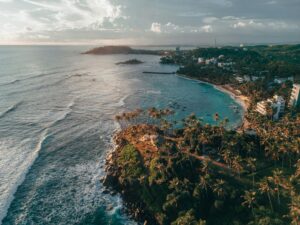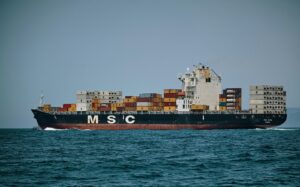
As single-use plastic bans gain momentum around the world, Sri Lanka struggles to walk-the-talk by succumbing to pressure from manufacturers and retailers. Accordingly, the three endeavours that comprised the ban on polythene, polystyrene-based packaging and cutlery continue to lack efficacious enforcement.
Ocean-minded consumers
But on a positive note, there now exists a growing community of eco-conscious consumers. On account of the social media age and increased digital connectivity, movements such as the Trash Tag Challenge and Fridays for Future have been catalysts in cultivating a greener generation.
New media has also played a pivotal role in emotionally engaging the audience on the horrific impacts that ocean plastics have on marine life. Devastating imagery of Albatrosses feeding on plastic bits from Sir David Attenborough’s Blue Planet II series inspired masses to cut down on single-use plastics.
Consequently, with this ocean-minded change in demand, it has become a necessity as opposed to a choice for businesses to make ocean-friendly options available to customers.
A call for restaurants to swap from single-use to reusable
 Single-use items in the form of bags, ‘lunch sheets’, water bottles, sachets and food-packaging are the most prevalent types of plastics that sit on the once pristine beaches of Paradise Isle. Among others, the accountability of restaurants and food vendors to such pollution is apparent.
Single-use items in the form of bags, ‘lunch sheets’, water bottles, sachets and food-packaging are the most prevalent types of plastics that sit on the once pristine beaches of Paradise Isle. Among others, the accountability of restaurants and food vendors to such pollution is apparent.
However, owing to the greater expense of acquiring reusable alternatives, restaurants who are willing to make changes find it difficult to strike a balance between the marine environment and financial gains.
For instance, a paper bag may approximately amount to three times the price of a plastic bag. Therefore, a mechanism that narrows this intention-action gap is fundamental to ensure a smooth transition to eco-friendly alternatives. With this notion in mind, we launched a voluntary reduction method called the ‘Pearl Protector Approved’ (PPA) Accredited Standardisation Certificate.
The certificate recognises restaurants and food vendors that cut down on single-use plastics, to drive up their customer base. Corresponding to the depth layers of the ocean, the PPA consists of the Euphotic Level, Disphotic Level and the Aphotic Level. A restaurant or food vendor may apply to be approved under one of the three pledges that they can adhere to. The certificate’s logo displays the image of a sea turtle to emphasise the need for its conservation as a species that is on the brink of extinction.
- No plastic Straws being used by staff or provided to customers.
- No plastic bags being used or provided to customers.
- No plastic bottles being used or provided to customers.
- No plastic lunch wrapping being used by staff or provided to customers.
- No plastic Straws being used by staff or provided to customers.
- No plastic bags being used or provided to customers.
- No plastic bottles being used or provided to customers.
- No plastic lunch wrapping being used by staff or provided to customers.
- No plastic cutlery being used or provided to customers.
- No plastic cups used by staff or provided to customers.
- No plastic packaging of any kind offered to customers.
- No plastic Straws being used by staff or provided to customers.
- No plastic bags being used or provided to customers.
- No plastic bottles being used or provided to customers.
- No plastic lunch wrapping being used by staff or provided to customers.
- No plastic cutlery being used or provided to customers.
- No plastic cups used by staff or provided to customers.
- No plastic packaging of any kind offered to customers.
- Promotes in recycling and reducing “Single use Plastics”.
- Provides filtered water facility.
- Prioritizes in segretaing waste.
As of 2020, Ranbath Organics and Cafe Kumbuk have adapted the certificate. Moving forward with positive reach, The Pearl Protectors plan to establish a platform that allows restaurants from the outskirts of Colombo to apply and customers to write reviews that are vital in monitoring certified vendors.
We hope that this initiative to harness the non-biodegradable waste that is being generated by the current dining culture will result in creating a ripple effect of inspiration to advocate for clean seas.

Tourism’s Ocean Impact: Are Sri Lanka’s Regulations Enough?
By Thisuri Rojie Ekanayaka As the winter weather rolls into the Northern Hemisphere while Sri Lanka’s skies begin to clear, the tourist industry prepares for

Ship Strikes: A Threat to Sri Lanka’s Marine Life
By Madhushini Gananathan What is the unseen wave of death silently endangering the ocean’s most magnificent creatures? Ship strikes have been a drastic threat to

මුහුදු කැස්බෑවන් සත්ත්ව ලෝකයෙන් තුරන් වී යාවිද?
By Muthu Tharanga Rajapakse වසර මිලියන සියයකට අධික කාලයක සිට පරිණාමය වෙමින් පැවත එන මුහුදු කැස්බෑවන් ලොව පුරා ප්රධාන වශයෙන් විශේෂ හතක් හඳුනාගත හැකිය. ඉන්
